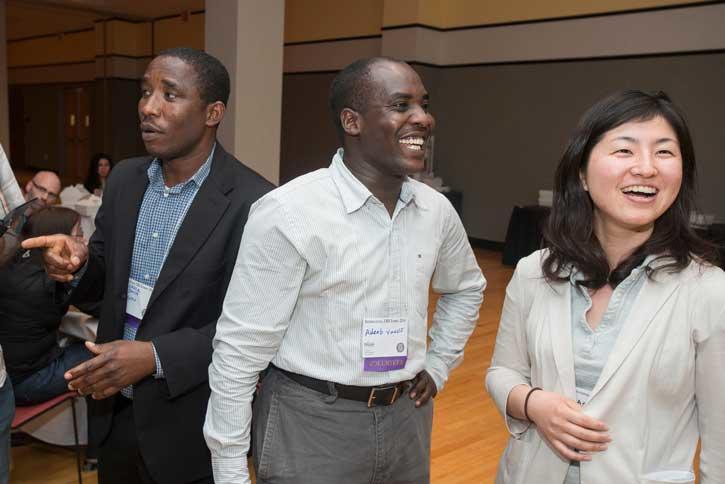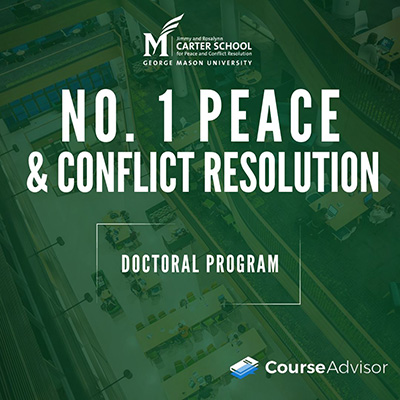Contact Us
For more information or to schedule an appointment, please contact Monique Norton at tcsinfo@gmu.edu or 703-993-1300.
The Carter School's renowned PhD program provides you an opportunity to become a professional scholar practitioner. You will apply the cutting edge theory, research, and practice learned in your classes to local and global issues.


At the Carter School, we encourage you to teach and publish, establishing yourself as a key voice in your area of specialization. Leverage the PhD program and your networks of colleagues as you establish an academic career path for yourself or build your own business or career by developing your skills and applying them in a multitude of careers as a holistic analyst and conflict resolution practitioner. Utilize the Carter School to network with current and future leaders in the field among your faculty, classmates, and beyond, to establish a stronger more peaceful world.
Scholarly and Academic Opportunities
PhD students leave our program prepared to contribute as scholars, teachers, and practitioners. Opportunities abound during your program for engaged research and meaningful practice.
Publish and Present
Tailor your work in your classes and the dissertation itself for publication. Undertake your research, attend or organize your own conferences and presentations and explore and discuss the discipline's latest issues.
Develop a Research Portfolio
Partner with and support faculty, your PhD colleagues and Center staff members on specific projects or long term research agendas or develop your own grants and projects with faculty, utilizing their years of experience and knowledge.
Build Your Teaching Portfolio
The Carter School provides a tiered teaching preparation for our PhD students to support the development of skilled teachers. Teaching opportunities include:
Serving as a discussion section leader for a small section of a faculty led course
Working with faculty or program directors on curriculum development
Instructor for a section with faculty mentoring
Individual teaching of a course section
Further information about teaching can be found on here, on the graduate student funding page.
Distinguished Grants and Fellowships
George Mason and the Carter School support students as they apply for prestigious awards. Apply through the University for Fulbright, Boren, and many other grants, scholarships and fellowships. More information can be found on the Provost Office's Graduate Fellowships site.
Develop your skills
Take your education to the Field
The Carter School offers a robust assortment of opportunities to get out and do research and intervention in the field. Our travel courses take you to areas impacted by conflict in the US and globally. Active trips include to Colombia, the Balkans, Indonesia, Jordan, Israel-Palestine, N. Ireland, West Virginia and many more.
We also offer CONF 625 courses called Engaging Conflicts. These are semester long opportunities to engage around a particular issue in either research and practice. Recent courses have traveled to Malta to look at migration issues and fostered dialogue across political divides here in the U.S.
Enhance your PhD with a Certificate Program
Students may elect to complete a Carter School graduate certificate in addition to the PhD program. Graduate certificates are opportunities for students to further tailor their academic program and specialize in a specific area of Conflict Resolution practice.
Certain graduate certificate courses can be used to fulfill PhD program requirements. Students should consult with the Certificate Program Director and Doctoral Program Director for policies on counting certificate courses toward the PhD degree.
Networking and Career Development
Our vibrant community brings distinguished guests and speakers to campus and provides opportunities to network with professionals, both within the academic community and in other sectors. These events along with student events (dissertation defenses, research presentations, etc.) are moments to connect and forge connections for the future.
The Carter School 's dedicated Career Services office is available to help with resume and CV preparation as well as job search strategies.
Earning a PhD from the Carter School is a challenge worth pursuing.
The Carter School seeks candidates who exhibit the academic capabilities, professional background, and personal investment in a focused area of interest. We have a faculty admissions committee that reviews all doctoral applications. We only admit new candidates in the fall and the application deadline is Dec. 1 for the following fall. Applications missing required items will not be considered.
Application Instructions (Apply by December 1 or earlier in mid-November with international credentials)
You will submit all items required for the application through your application portal. If you want to pursue a PhD from the Carter School, you will need:
- A completed Online Application for Graduate Study.
- A baccalaureate degree AND a graduate level degree from a regionally accredited institution of higher education or international equivalent, which must be verified from official transcripts. (MA, MS, JD, etc.)
- Transcripts:The application will require you to submit unofficial transcripts. In addition, an official copy of transcripts from each undergraduate and graduate institution you attended are also required upon admission. Transcripts must be in sealed, unopened envelopes to be considered official.
- A goals statement, which answers these questions:
- How has your past experience prepared you to engage in doctoral study at the Carter School?
- What areas of study and questions are driving your interest in doctoral studies at the Carter School? In other words, what do you want to research? (This is not intended to be a full dissertation proposal, but rather about five pages explaining your area of interest for your inquiry throughout your doctoral journey.)
- How will this program equip you for your future?
-
Please limit your goals statement to about 9-12 pages double spaced, and be sure to address each of the three questions.
- Three letters of recommendation, which can be from faculty, colleagues, or supervisors who can attest to your ability to perform well in a doctoral program. Letters should be submitted electronically. When you include the name and contact information of your references, a link will be emailed to them to submit their letters online.
- A writing sample, submitted electronically, which must be authored only by you and demonstrate your potential to complete dissertation research. Examples include a master's-level thesis or a graduate-level research paper. There is no length requirement, however please provide a full paper, or a full chapter or at least a full section of a longer work, as generally we need to read at least ten pages of writing to get a sense of your academic writing.
- A current résumé or curriculum vitae.
- A GRE score is NOT required, but may be submitted. Those who submit GRE scores are not favored over those who don't.
- Interview: Interviews are conducted by invitation only for selected applicants.
*Applicants with international credentials will need to submit additional items.
Send transcripts to:
Office of Graduate Admissions
George Mason University
4400 University Drive MSN 4C8
Fairfax, VA 22030
When you submit your application, you'll get an email explaining how to view your status in your application portal . You'll see the specific items that we have received and a note on any that need to submitted. It is your responsibility to ensure that all documents are submitted online and that transcripts are delivered and linked to your online application by the application deadline. Incomplete applications will not be reviewed.
Application deadline:
Fall*: December 1
*This program does not have Spring admissions cycle. Applicants with international credentials are asked to apply by mid-November, as international transcripts require additional reviews that can be lengthy during the December review period.
Getting a Head Start
You might qualify to have your PhD course load reduced by up to 15 credits if you:
Have an MS in Conflict Analysis and Resolution from Mason.
Have related graduate credits.
Your advisor and the program director will review the courses you've taken and determine which ones apply.
Doctoral Funding
Some programs are available to help you offset the costs of earning a PhD from the Carter School. They include:
- Assistantships: The Carter School offers these positions to some newly admitted doctoral students to work on research/grant projects. When you apply, you'll be automatically considered for one of these positions; there is no formal application process.
- Financial aid: The Carter School hires several students for part-time administrative jobs. Any graduate student is eligible, and application information will be provided when posts come open. These appointments match the needs of the position with the student's experience and skills.
- Presidential Scholar Award: This source of funding comes from George Mason University. The Carter School nominates one incoming PhD student each fall for this award, which is determined by the Office of the Provost. Criteria include a minimum GPA of 3.5 in the most recently earned degree, and a minimum combined math and verbal GRE score of 1,200 (score earned within the last five years). Based on the latest GRE scale, the minimum required combined math and verbal GRE score is 310.
- Graduate Inclusion & Access Scholarship: This source of funding comes from George Mason University. As a new applicant, you can apply for this scholarship at the same time you apply for our doctoral program. When you indicate your interest in this scholarship in the application, additional questions will appear as well as upload links. An essay and current resume/CV are required materials for this scholarship. The essay is different from your Carter School application goal statement.
Incoming Students
Send official transcripts:
Official transcripts are required from all schools you have attended. Please ensure these are sent prior to the first day of classes to avoid any registration holds.
Schedule your Advising Appointment:
Students must make an advising appointment to before registering for courses. Please email Charisse Cardenas.
Set up your Patriot Pass account:
To activate your new student PatriotPass account, you will need your G number, indicated on your admission email/letter, and CLAIM ID number, which is your birth month, day and year in 2-digit format (i.e., June 30, 1976, would be entered as 063076).
Register for classes:
- Using your Patriot Pass login information, you will view the schedule of classes, then register.
- You should register and pay for your tuition and fees before the first day of class of each term.
- Review course descriptions.
